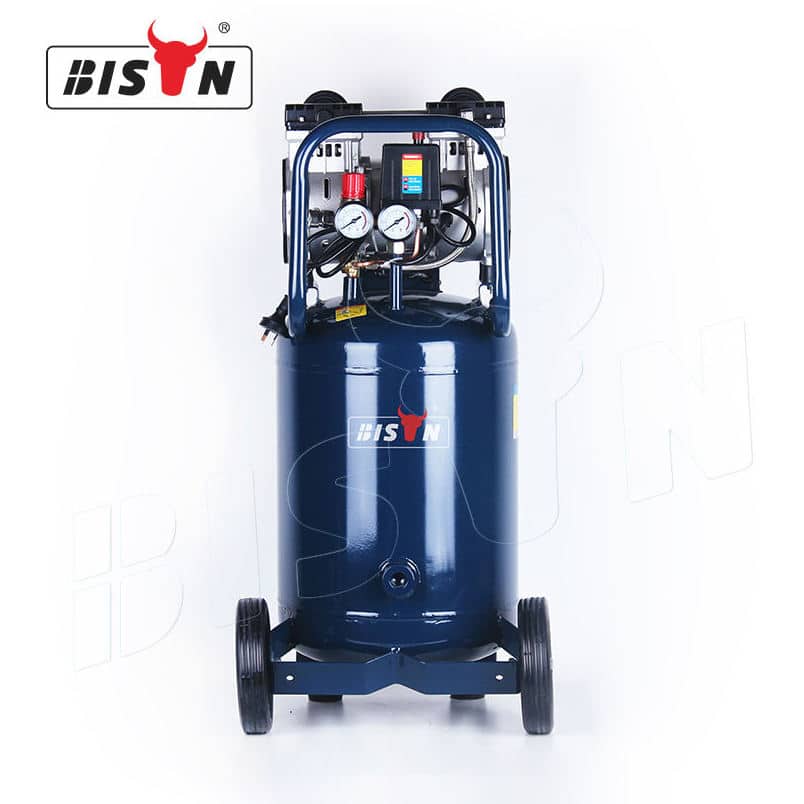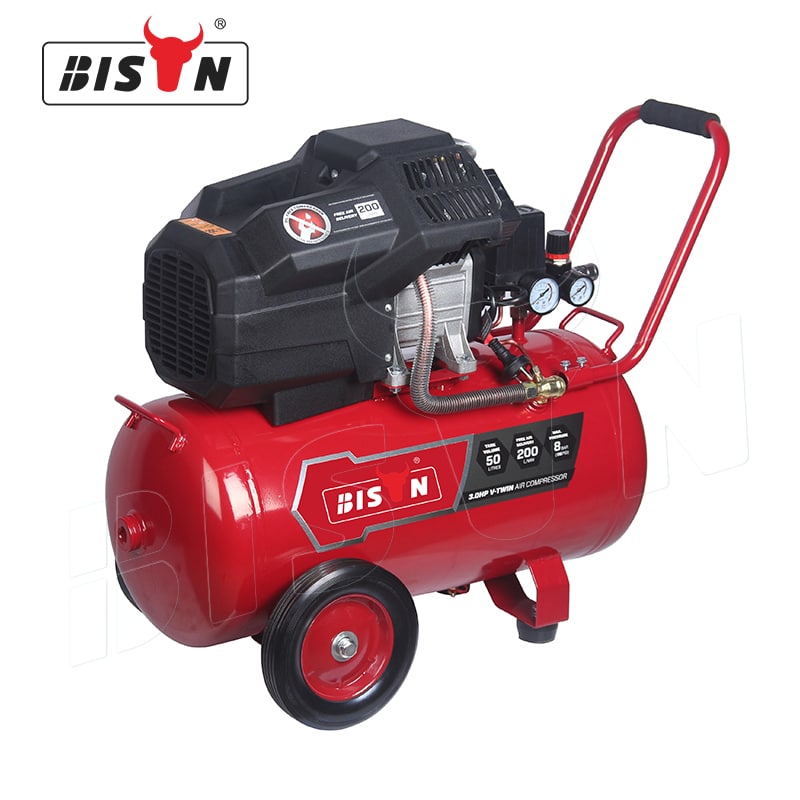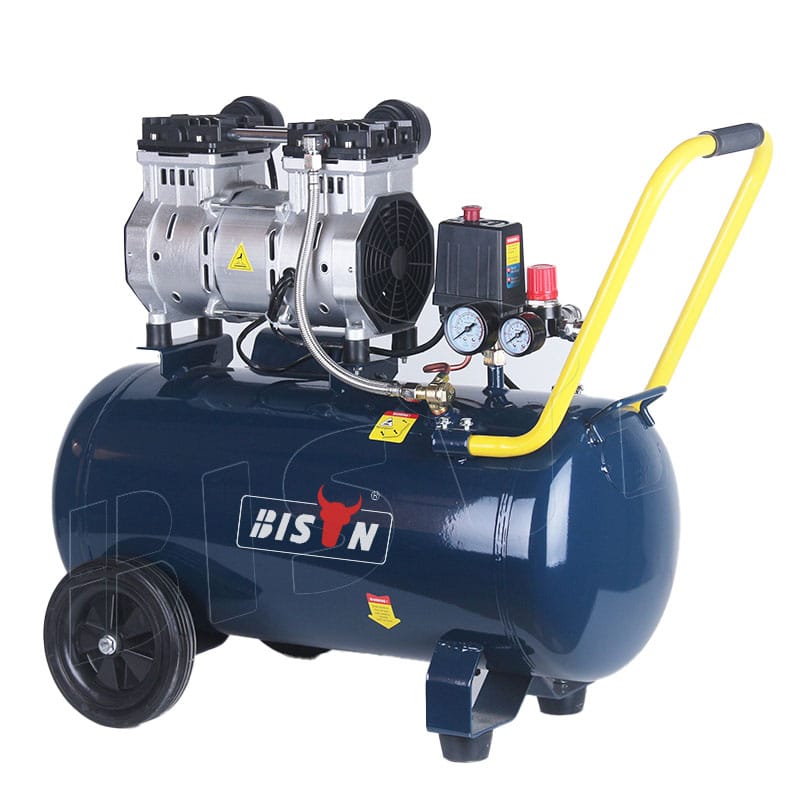air compressor blog
Oil-free Air Compressors vs. Oil Lubricated Compressors
- Sep 9, 2022
This is BISON AIR COMPRESSOR, an air compressor manufacturer from Taizhou, Zhejiang Province, China. Air compressors are mainly devided into two types, Oil lubricated air compressors and Oil-free air compressors. Our factory supply both of them. When shopping for an air compressor, you must choose from two main options: oil-lubricated compressors and oil-free compressors. Although both perform the same compressed air function, they are very different in how they work, how they make up, and what type of application they are designed for.
However, as a retailer or a distributor, when selling air compressors, the first thing that may strike your customers is the difference between oil-free and oil lubricated air compressors as well as which type to perchase.What actually is the difference between an oil lubricated and oil-free air compressor? And which one should your customers select?

Here’s something about the main differences between oil lubricated air compressors and oil-free air compressors and which type meets which demands. Each one has its advantages and disadvantages over the other.
Oil-Free Air Compressor
How oil-free air compressors work?
The built-in oil system to lubricate the pump will increase the weight, complexity and cost of the air compressor. Wouldn’t it be brilliant if they could find a way to give up all this? Therefore, the era of oil-free air compressors has arrived.
Oil-free air compressors do not use oil, but use Teflon lining in the cylinder to reduce heat and friction. It works fine and is basically maintenance-free. Therefore the system is suitable for small air compressors and infrequently used tools.
However, when comparing oil-free air compressor and oil lubricated air compressor, it is important to consider air compressor requirements and corresponding applications. When your cusomers need a device smaller and more portable, an oil-free compressor is the right choice. Oil-free air compressors are not designed for a constant duty cycle, while they are more suitable for household users with occasionally application. Besides, Hospitals, along with water treatment and other sensitive manufacturing operations, are major users.
Advantages and disadvantages of oil-free compressors
These types of pumps (twin cylinders) operate at lower RPMs, reducing noise, heat, and friction, resulting in longer pump life cycles. In combination with better castings/tighter tolerances and better friction-free coatings, oil-free compressors are an excellent choice for many applications.
- Cleaner and drier air
- Lighter and more portable
- Maintenance free, no need for oiling
- No oil filter required
- Can be used in cold weather
- Quieter and more efficient
What is an Oil Lubricated Air Compressor?
Similar to a reciprocating engine, an air compressor uses a moving piston in a cylinder to suck in air and then compress the air. Instead of using fuel and sparks to ignite the air, compressed air is sent to the gas tank, where it is kept at high pressure.
All movement of the piston in the cylinder generates a lot of heat and friction, which will cause the items wear out, which is bad to the machine. Eventually, the piston seal will start to wear down and the air pressure generated by the cylinder will be lower than it was designed to be.
The best way to solve the problem is to use lubricating oil, which is precisely like having lubricating oil in a car, and for the same reason as oil lubricated compressors. It can reduce heat and friction. The accumulated heat will be sucked away from the pump casing and cylinder by the oil.
Only by ensuring that the right amount of oil enters the cylinder and piston can the pump run as the way it should. The main difference between oil-free and oil lubricated air compressor is the oil and the necessity to ensure its existence. It also means that the operator needs to replace the oil occasionally, which means more maintenance.
Advantages and disadvantages of oiled compressors
The industry standard for professional oiled stationary compressors are typically installed in high-pressure and high-capacity workshops, keeping all tools running 24/7 and, if properly maintained, can withstand years of use. Suitable for professional applications
- Higher RPM means higher PSI/CFM rating
- Heavier and less portable
- Require routine maintenance
- Can be used in hot climates
- Oil pollutes the air
Main Differences Between Oil-Free and Oil Lubricated Air Compressors
Except for the obvious differences in the lubrication system, the functions of the oil-free air compressors and the oil lubricated air compressors are the same. Both styles are available in various sizes and CFM retings. Both types of air compressors have their own pros and cons. So, let’s explore.
Noise generation
One major difference between oil compressors and oil-free compressors is their noise production. Oil lubricated are less noisy than oil-free.
This is because oil-lubricated units lubricate better than oil-free units. As a result, they run quieter because there is less friction between the pump’s moving parts.
So, if a noisy unit presents some challenges, you need to consider an oil lubricated unit. On the other hand, if you don’t care about the noise the machine makes, then you can choose either.
Air contamination
One of the main problems when using oil-lubricated air compressors is the contamination of the compressed air with oil. Depending on what you’re using compressed air for, this could be very harmful to the equipment or tools you use to power and the project you’re working on, or it might not affect anything.
For example, if you run a business or workshop where a little oil contamination in the compressed air would not be a big problem, such as a car workshop, lubricating machines with oil would be fine. However, high-purity air is required when you operate machinery that processes food, pharmaceuticals, electronics, and other highly sensitive products. Using oil-contaminated air for things like painting may also contaminate the paint with oil, making it harder to dry or have a good finish.
You can use air filters and separators to remove oil from the compressed air before passing it on to your tools and equipment, but if you don’t want oil in your system, opting for an oil-free unit is ideal.
Durability
Durability is another important issue for oil-lubricated and oil-free air compressors. Oil-lubricated units are more durable than oil-free units because there is oil in the pump and, less friction occurs, and not much wear occurs in the machine. If the oil in the machine has gone bad, you must replace it with a new one, and you can run like new. On the other hand, permanent lubricants that use oil-free devices, such as Teflon, wear down over time. Once worn, the machine will get louder and noisier until it eventually falls apart. This is why oil lubricated units are more durable and used for commercial projects that require long hours of work. They are more durable because of constant lubrication to reduce friction and cool the machine.
Cost
Oil-lubricated units are generally more expensive than oil-free machines because there are more working parts in oil-lubricated units.
So, if you are a homeowner and need an air compressor for simple DIY projects at home, such as stuffing mattresses, car and bicycle tires, then a small oil-free air compressor is your best option because it is more cheaper and easier to maintain.
On the other hand, if you need one for an industrial project, such as powering an air tool in a dealership or auto workshop, a heavy-duty oil-lubricated machine is the better choice depending on the amount of usage you want to get rid of.
In this case, size is usually the deciding factor, not cost. So, consider the pros and cons of oiled versus oil-free units and choose the one that best suits your needs.
Maintenance
The fact that oil lubricated air compressors contain lubricating oil means that more maintenance is required. Eventually, the oil must be changed, even if the replacement frequency is not high.
Oil-free machines are a blessing for lazy people. If you are too lazy to add oil regularly, oil-free machines are your best choice. Lubricated air compressors use lubricating oil to make the machine run normally. Once you forget to add the oil, the movement of the piston will cause the parts to wear out faster and accelerate the service life of the machine. Therefore, in terms of maintenance, the oil lubricated air compressor occupies a certain disadvantage.
Therefore, BISON has made certain improvements to the oil lubricated air compressor. We designed the certain cylinder head named after BISON to solve the shortcoming of oil leakage during the use of the air compressor. This major breakthrough makes BISON’s oil lubricated air compressors cleaner when used, and prolongs the service life of the machine. This really kills two birds with one stone. If you want to purchase oil lubricated air compressors, BISON will not let you down.
Oil vs Oil-Free Air Compressors: Which is better?
Now that you understand the basics of each type, we can now answer the question: “How does oil-free compare to oil-free and which is better?” No doubt you’ve heard some myths, so let’s debunk them and make explain what they mean to you (the user).
Myth 1: Oil-lubricated compressors last longer
The main argument at the moment is that oil-free compressors cannot match the longevity and reliability of oil-lubricated compressors and, therefore, cannot provide the same value. Routine maintenance and regular oil filling tend to make oil-filled compressors more durable and last longer than first-generation oil-free machines. While this may have been the case before oil-free technology took off, it’s no longer true. Today’s oil-free compressors run cooler and are better protected than ever before.
Myth 2: Oil-free compressors are louder
Likewise, oil-free compressors of the past were undoubtedly loud, but today’s designs feature direct drive, dual-piston (duplex) pumps, and advanced noise reduction technology to make oil-free compressors softer than their oiled, loud counterparts.
Myth 3: Oil-lubricated compressors run cooler and withstand extreme conditions
In fact, the dual-pump design of oil-free compressors allows them to achieve the required CFM/PSI in half the number of revolutions (RPM). They also use heat-dissipating aluminium cylinders for cooling. In fact, oil-free compressors are preferred in extremely cold environments, as there is no fear of oil turning into sludge. On the other hand, if working in extreme heat and humidity, oiled compressors may be required to dissipate heat faster and prevent rust during a given duty cycle.
Which one is right for you? Final thoughts
So, if you customers are DIY homeowner or contractor looking for a portable compressor to take with you on the job site, an oil-free option may be preferable due to its lighter weight and the ability to use them in any orientation.
If you are looking for stationary compressors to power high PSI/CFM air tools, oil-flooded compressors are your options. Or, if noise, air purity, filter changes, and maintenance are your concerns, then oil-free stationary compressors would be ideal.
BISON provides oil-flooded and oil-free compressors to many industries. Contact our team today to find the right air compressor for your medical gas system or other applications.
Frequently Asked Questions about Oil-free Air Compressors vs. Oil Lubricated Compressors
How oil-free compressors are lubricated?
Most oil-free compressors use water or other materials, such as Teflon coatings, to keep the mechanism running smoothly. Because the lubrication of the bearings and gears is outside the compression chamber, proper sealing prevents any oil from contaminating the compressed air.
Do oil-free compressors last for a long time?
The lifespan of an oil-free piston air compressor is typically around 10-15 years, while the lifespan of an oil-free screw air compressor is typically around 20-30 years. You can usually expect 2,000 to 8,000 hours of service.
If you have any enquiries about the BISON air compressor, we would love to hear from you.












